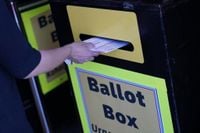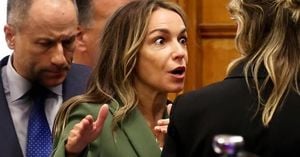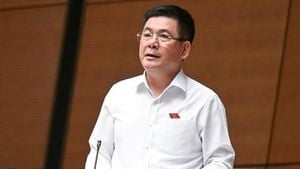On Tuesday, June 17, 2025, Virginians across the Commonwealth headed to the polls for a pivotal primary election that will shape the state’s political landscape ahead of the November general election. Democrats are set to select their nominees for lieutenant governor and attorney general, completing a ticket that already features former congresswoman Abigail Spanberger as the gubernatorial candidate. Meanwhile, Republicans have locked in their statewide nominees without a primary contest, setting the stage for a high-stakes showdown in the fall.
Virginia’s 2025 primaries carry particular significance as the state, along with New Jersey, holds statewide elections the year after a presidential race. These contests often act as a barometer for national political sentiment, especially with President Donald Trump back in the White House and Republicans controlling Congress. Political analysts and party strategists alike are watching closely to gauge voter enthusiasm and direction, especially in a state that has increasingly shifted toward swing status.
Democrats have faced some recent challenges in Virginia. Republican Governor Glenn Youngkin’s 2021 victory over former Governor Terry McAuliffe marked a notable GOP win, and although Democrats regained control of the state legislature narrowly in 2023, the party’s margins in recent presidential elections have shrunk. Kamala Harris’s 2024 win in Virginia was by less than six points, down from Joe Biden’s 10-point margin in 2020. Still, history offers Democrats hope: the party holding the White House often struggles in Virginia’s off-year elections, suggesting potential openings for gains once nominees are finalized.
The lieutenant governor’s race attracted particular attention, with six Democrats vying for the nomination. Former Richmond Mayor Levar Stoney, endorsed by U.S. Transportation Secretary Pete Buttigieg, is among the frontrunners, emphasizing his ties to established Democratic leadership. State Senator Ghazala Hashmi, representing Richmond and suburbs, has championed reproductive health and earned backing from abortion rights political action committees. Virginia Senator Aaron Rouse from Virginia Beach highlighted his legislative work, while Prince William County School Board Chair Babur Lateef, an eye surgeon, focused on education and healthcare. Former federal prosecutor Victor Salgado and retired U.S. Department of Labor worker Alex Bastani rounded out the diverse field, emphasizing democracy and labor rights, respectively.
Political science professor Stephen Farnsworth of the University of Mary Washington noted that, despite the crowded field, the candidates share many policy positions—supporting abortion rights, living wages, affordable housing, and accessible healthcare—and mainly distinguish themselves through regional support and campaign emphasis. He observed, “Many of these candidates for lieutenant governor would vote more or less the same way if they become lieutenant governor, but they have to get through the primary and the general election first.” Farnsworth also highlighted how the Democratic gubernatorial nominee Abigail Spanberger’s centrist stance might allow the party’s base to select more liberal candidates in down-ballot races.
The Democratic nominee for lieutenant governor will face Republican John Reid, a conservative talk-radio host and the first openly gay candidate to secure a statewide nomination in Virginia. Reid emerged as the de facto Republican nominee after his primary opponent withdrew amid controversy.
For attorney general, former Delegate Jay Jones and Henrico County Commonwealth’s Attorney Shannon Taylor are battling for the Democratic nod. Jones, who previously ran unsuccessfully in 2021, represents a political legacy in Hampton Roads, while Taylor brings over a decade of prosecutorial experience, including serving as a special prosecutor in the aftermath of the 2017 Unite the Right white supremacist rally. The winner will challenge incumbent Republican Attorney General Jason Miyares, who is seeking reelection unopposed in the primary.
Election Day in Virginia saw a mix of enthusiasm and measured turnout across regions. Early voting had already set a record pace, with over 204,000 Virginians casting ballots before Election Day, more than 92% of whom participated in the Democratic primary. In Hampton Roads, turnout was steady, with cities like Suffolk reporting 2% turnout by noon and Newport News seeing nearly 2,900 voters. Virginia Beach recorded about 4,000 Democratic votes and roughly 180 Republican votes by midday, excluding early ballots. Officials across Norfolk, Chesapeake, Hampton, Portsmouth, and Newport News reported smooth voting operations with no machine issues.
At polling places such as Alexandria’s George Washington Middle School, voter engagement exceeded expectations, with nearly 170 voters by midmorning. Voters expressed a range of motivations: Phoebe Kilgour, a political communications director and mother, emphasized the importance of affordable child care and paid family medical leave in her choice of State Senator Ghazala Hashmi for lieutenant governor. Brian Ferrell, an appellate attorney, focused on public school funding, particularly in Alexandria, where teacher retention is a concern.
Other voters prioritized reproductive rights and housing affordability. Karen Spaleta, a geologist new to Virginia, voted for Hashmi and Taylor, highlighting abortion access as a top issue. Young voter Austin Sponheimer, a gay man with a trans partner, selected Aaron Rouse for lieutenant governor and Jay Jones for attorney general, citing housing and abortion rights as key concerns. In Norfolk, Stephanie Checchia cast her votes for candidates she believed would oppose Trump’s policies, while Jim LeGrange III, a restored felon, supported candidates who resisted the prior administration’s agenda.
However, some voters voiced frustration with the Democratic Party’s direction. John O’Sullivan, a retired veteran, voted for Hashmi and Taylor based on their experience and stances but expressed dissatisfaction with the party’s current trajectory.
Beyond the statewide races, primaries took place in several House of Delegates districts, including competitive contests in Richmond, Petersburg, and Chesapeake. Democrats aim to expand their slim 51-49 majority in the House, while Republicans seek to leverage Governor Youngkin’s record to regain control. All 100 House seats will be contested in the November general election.
Looking ahead, Abigail Spanberger plans to launch an eight-day, 40-stop “Span Virginia Bus Tour” starting June 21, traveling statewide with her lieutenant governor and attorney general running mates to connect with voters. Meanwhile, Republican gubernatorial nominee Winsome Earle-Sears prepared to transition from a spirited primary campaign to the general election, planning a rally on Election Day evening.
Virginia’s 2025 primary election encapsulates the state’s complex political dynamics, reflecting national tensions and local priorities. As voters decide their nominees, the outcomes will offer a glimpse into the electorate’s mood and set the tone for a consequential fall election season.






